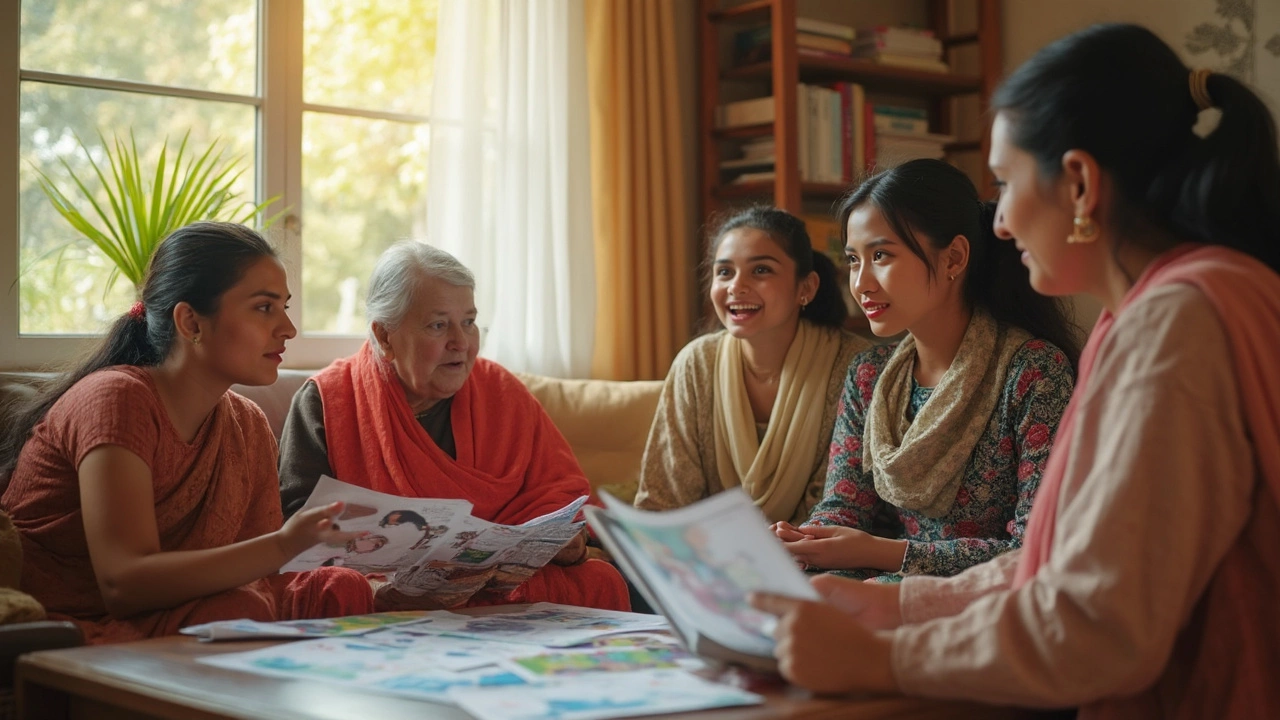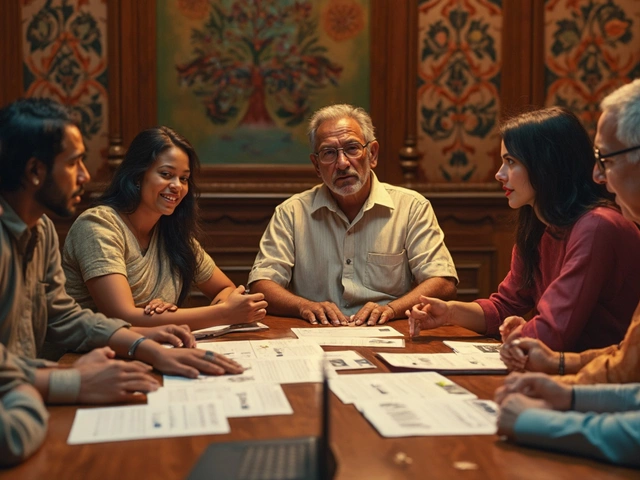Maybe you’ve been helping your mom with groceries, rides to the doctor, or just making sure she takes her meds every night. It takes time and energy—so the big question is: can you really get paid for all this work in Massachusetts?
Turns out, yes—if you qualify. Massachusetts actually has a few solid programs set up for family caregivers. Some even let you get paid for hours you’d spend taking care of your mom. The trick is knowing which programs to ask about and how to work through the application steps.
Around here, the biggest names you’ll run into are MassHealth’s Personal Care Attendant (PCA) Program and something called Adult Foster Care (AFC). These aren’t complicated in theory, but the paperwork can feel like another full-time job. Most folks qualify through MassHealth (the state’s Medicaid program), so if your mom’s income and assets aren’t too high, that’s the first place to look.
Don’t just assume you’ll be stuck doing it for free. With the right info, you can actually turn your love and hard work into a real paycheck—while making sure your mom stays where she’s happiest and safest.
- Understanding How Family Can Get Paid as Caregivers
- The MassHealth Personal Care Attendant (PCA) Program
- Adult Foster Care (AFC) and Group Adult Foster Care
- Eligibility Criteria and Application Steps
- Tips for Navigating the Paperwork and Process
- Beyond State Programs: Other Ways to Get Paid
Understanding How Family Can Get Paid as Caregivers
It’s pretty common for family members to step up and care for their aging parents, but not everyone knows you can sometimes get paid for it—especially in Massachusetts. Instead of hiring strangers, programs here let people like you provide the help your loved one needs and get a paycheck for your time. It isn’t a loophole or some secret backdoor: the state actually supports these arrangements because it’s often better and cheaper than nursing homes.
The two main routes are through state-supported programs. The first is the Personal Care Attendant (PCA) Program through MassHealth (Massachusetts Medicaid). The second is Adult Foster Care (sometimes called AFC). Both let family members, sometimes even adult children, become paid caregivers—though there are a few rules you need to meet first.
Here’s how it works:
- If your mom is eligible for MassHealth (meaning she meets certain income and asset limits), she might qualify for in-home caregiving services.
- The state usually lets family members (but not a spouse or legal guardian) get paid as the caregiver.
- Typical tasks you get paid for include help with bathing, getting dressed, eating, taking medicine, and getting to appointments. Pretty much the stuff you’re probably already doing.
- Payments often happen through an agency that handles wages, taxes, and hours, so you don’t have to act like a private contractor.
One eye-opening thing: The need for these programs is only going up. In Massachusetts, more than 1 in 6 adults is over 65, and around 70% of adults over age 65 will need some type of long-term care at some point. The government recognizes that family caregivers are keeping the whole system running.
| Program | Who Can Be Paid? | Monthly Pay Range (2024) |
|---|---|---|
| MassHealth PCA | Most family members except spouses | $1,300 - $2,800 |
| Adult Foster Care | Family or non-family, not spouse/legal guardian | $9,000 - $18,000/year |
You’ve probably heard stories about people getting paid as family caregivers and thought it sounded too good to be true. But the paid caregiver Massachusetts programs really do exist—they just take some paperwork and a bit of patience to get started.
The MassHealth Personal Care Attendant (PCA) Program
So you want to become a paid caregiver for your mom and you’re in Massachusetts? The paid caregiver Massachusetts program that most people use is the MassHealth PCA Program. This setup lets your mom, if she qualifies for MassHealth, hire pretty much anyone she trusts—including you—to help with daily stuff she can’t do alone. Think dressing, bathing, cooking, taking medicine, and getting around the house.
Here’s how it actually works. Your mom, as the "consumer," decides who to hire. You, as her chosen PCA (Personal Care Attendant), can be that person. MassHealth pays you after a home assessment and some paperwork. The hours you get paid for depend on how much help your mom needs. The program won’t pay you for things like running errands, but they will pay for hands-on care and safety-related tasks.
If you’re wondering about the nitty-gritty of pay rates and qualifying, check this out:
| PCA Hourly Wage (2025) | $18.15 |
|---|---|
| Typical Weekly Hours Allowed | Up to 50, depending on need |
| Eligibility | Must be MassHealth member, require physical help with at least 2 activities of daily living |
| Paid Relationship Exceptions | Spouses and certain legal guardians can't get paid; adult children usually can |
The local ASAP (Aging Services Access Point) and PCM (Personal Care Management) agencies are the ones who do the home assessment and then tell MassHealth how many hours are medically justified. They’ll send someone out to walk through a typical day with your mom, decide which activities she needs help with, and fill out reports for you. If she gets approved, they help you handle hiring and timesheets.
Steps to get started:
- Your mom needs to be signed up for MassHealth (Standard or CommonHealth).
- Call MassHealth or a PCM agency to start an assessment request.
- The agency visits and works out an eligibility plan and hours.
- You do a quick background check and employment paperwork.
- You track hours on a timesheet and get paid (usually biweekly).
One little snag: If you already work full-time somewhere else, you might need to show you have enough hours in your week to do this job. Also, sometimes it takes 1-3 months to get signed up and start getting paid, but the pay is retroactive to when you started providing care if the paperwork’s all in order.
If all this sounds like a lot, don’t freak out. Most agencies will walk you through each step, and people use this program all over Massachusetts every day. It’s one of the most solid options families have to keep their loved ones at home and still get a real paycheck.
Adult Foster Care (AFC) and Group Adult Foster Care
If your mom needs help with daily activities—like getting dressed, eating, or taking medications—the Adult Foster Care (AFC) program in Massachusetts could be a game changer. It’s one of the main ways family members can actually get paid for providing hands-on care at home.
Here's how it works: the AFC program (sometimes called Adult Family Care) pays qualified caregivers for helping someone who would otherwise need to live in a nursing home. The caregiver can be a relative, but you can’t be your spouse or legal guardian. So, adult children often qualify to provide care for their parents. The person receiving care needs to be on MassHealth (Medicaid) and must require help with at least one daily living activity.
Payments vary but usually range from $10,000 to over $18,000 per year, depending on how much care is needed. MassHealth covers the cost, and you get a tax-free stipend every month. AFC providers—usually local care agencies—will train and support you, and a nurse will check in once a month. It's a real job, with a regular paycheck.
- Your mom must live in the same household as you (the caregiver).
- The home has to meet basic safety rules, but you don’t have to move anywhere new.
- You’ll need to fill out yearly recertification forms and work with your AFC agency to keep things rolling smoothly.
For seniors who don’t need quite as much help, there’s something called Group Adult Foster Care (GAFC). This usually happens in assisted living or some approved apartment settings. Instead of paying a family caregiver directly, GAFC provides personal care staff to help residents at set hours. It’s less flexible but can still take a lot off your plate if your mom doesn’t want to move into a nursing home but needs more than just light help.
paid caregiver Massachusetts programs like AFC and GAFC help you keep your loved one at home, safe and comfortable, while giving you serious support. Here’s a quick breakdown of AFC and GAFC side by side:
| Program | Who Can Be Caregiver | Where Care Is Given | Monthly Stipend/Benefit |
|---|---|---|---|
| Adult Foster Care (AFC) | Non-spouse relatives (including adult children) | Your home (must live together) | $800–$1,500/month (tax-free, varies by care needs) |
| Group Adult Foster Care (GAFC) | Provided by agency staff, not family | Assisted living or approved apartments | Services covered; no payment direct to family |
Before you jump in, call your local Aging Services Access Point (ASAP). They’ll help you figure out if your family qualifies, set up the initial screening, and guide you through every hoop—so you have fewer headaches and your mom gets the care she deserves.

Eligibility Criteria and Application Steps
Getting paid to look after your elderly mom isn’t just about wanting to help—it’s about meeting some specific rules Massachusetts sets for these paid caregiver Massachusetts programs. You’ve got to check a few boxes before the money starts coming in, so let’s break down what you need and how to get started.
Who’s Eligible?
- Your mom must live in Massachusetts and either already be on MassHealth (state Medicaid) or qualify for it. Single seniors usually need to have less than $2,000 in countable assets, not counting a house or car they live in.
- Her medical situation has to line up with needing hands-on help with daily activities—things like bathing, dressing, eating, or taking medications. A nurse or social worker usually checks this during an assessment.
- You (the caregiver) can be almost anyone—an adult child, a close relative, even a spouse in some cases (the only restrictions are for spouses under the PCA program, but not under Adult Foster Care—go figure!).
MassHealth PCA Program: How to Apply
- Confirm your mom is on (or eligible for) MassHealth. If she isn’t, apply for MassHealth first. This can be done online at the MassHealth site or at a local office.
- Ask her doctor for a referral for help at home. That’s usually enough to start the ball rolling.
- Get a PCA evaluation from a local agency (like ADRC, ASAP, or an Independent Living Center). They’ll send someone out to see what kind of help your mom needs and for how many hours per week.
- Once approved, you’ll fill out some employer forms (since your mom technically becomes your employer—the state pays you through a fiscal agent) and attend a quick orientation. After that, you can clock your hours and get paid.
Adult Foster Care (AFC) and Group Adult Foster Care:
- Your mom needs to live with you (the caregiver) in most cases for AFC.
- You apply through a local ASAP or AFC agency—there are about a dozen of these across the state.
- After an in-home assessment from a nurse/social worker, you’ll get a care plan and learn about pay rates (which start at about $10,000 to $18,000 per year, depending on daily care needs, as of early 2025).
- You’ll need to show you can provide all care needs safely and agree to regular check-ins and paperwork.
It’s not lightning-fast. On average, families in Massachusetts say the process takes from four to eight weeks, but missing forms or skipped medical visits can drag it out for months. Here’s a quick look at what usually matters:
| Requirement | PCA Program | Adult Foster Care (AFC) |
|---|---|---|
| MassHealth Coverage | Required | Required |
| Live-In Caregiver | Not Needed | Yes, usually same household |
| Allowed Caregivers | Family (not spouses) | Family, including spouses |
| Proof of Need | Assessment by agency | Assessment by nurse/social worker |
| Approximate Pay (2025) | $16–$20/hr | $10k–$18k/year |
The biggest tip? Double-check all documents and follow up often with your agency. A missing doctor’s note or half-finished application is usually what slows people down. If you hit a wall, agencies like ASAP or the Independent Living Centers can answer questions—for free.
Tips for Navigating the Paperwork and Process
This is where most people hit a wall: paperwork. Massachusetts makes you jump through some hoops, but you can save time and stress if you know what you’re doing. Here’s what you need to tackle:
- Get Organized Early: Make a folder (digital or paper) to keep every form, letter, and copy of ID—trust me, you’ll need these handy.
- Understand What Each Program Wants: For the MassHealth PCA Program or AFC, you’ll fill out specific applications. MassHealth wants income info, proof of residency, your mom’s ID, and a completed medical evaluation. The AFC program asks for both financial and medical forms, plus a doctor's note confirming your mom needs help with daily tasks.
- Don’t Skip the Assessments: For both programs, a nurse or caseworker visits your home to check your mom’s care needs. This visit matters—a lot—so document everything you do for your mom, down to reminders for her meds or help with transfers.
- Double-Check Deadlines: Applications for programs like MassHealth can stall because of missing paperwork or missed deadlines. If they say 30 days for a response, set a reminder so nothing slips through.
- Ask for Help When Stuck: Call the local Aging Services Access Point (ASAP) or MassHealth Customer Service if you hit confusing jargon or get stuck. Community nonprofits like Mystic Valley Elder Services can also walk you through forms for free.
- Follow Up (Seriously!): Don’t assume silence means approval. If you haven’t heard back two weeks after you applied, start calling. It’s not rude; it’s necessary.
Here’s a quick look at stats from 2023 showing how applications usually play out in Massachusetts:
| Program | Average App Processing Time | How Many Approved |
|---|---|---|
| MassHealth PCA | 4-8 weeks | 78% |
| Adult Foster Care | 6-10 weeks | 71% |
One huge tip: use the official online MassHealth application if you can. It’s at mass.gov. The site guides you to the right forms for paid caregiver Massachusetts programs.
This process isn't quick, but staying organized and asking questions can save weeks of headache down the line. Keep all communication in writing so you have proof if something gets lost or you need to appeal.
Beyond State Programs: Other Ways to Get Paid
If your family doesn’t qualify for MassHealth or state-run programs, all is not lost. You’ve still got some routes to get paid for helping your elderly mom, even without direct support from Massachusetts’s big-name benefits.
First up, let’s talk about paid caregiver Massachusetts options that don’t depend on state funding. Private pay is more common than you think. Sometimes, families set up their own agreement where the parent pays the caregiving family member out of their personal funds. It might sound awkward at first to talk money, but it’s a smart way to recognize your time and keep things fair, especially if siblings are involved. Making a formal caregiver contract helps avoid family drama and keeps boundaries clear.
- Caregiver Contracts (Personal Care Agreements): Draft a simple written agreement that lists your duties, hours, and pay rate. This helps if Medicaid ever takes a look at your mom’s assets later for long-term care eligibility.
- Long-Term Care Insurance: Some policies cover payments to family members for care at home. If your mom has private long-term care insurance, check the fine print—it might allow her to pay you directly for approved services.
- VA Aid and Attendance Benefits: If your mom is a veteran or the surviving spouse of one, the VA might provide money to pay family caregivers. You just need to prove she needs daily help and go through the VA’s application.
- Tax Credits and Deductions: You might get some relief during tax season if your mom qualifies as your dependent. Look into the IRS Credit for Other Dependents and medical expense deductions, since these can add up quickly.
Caregiver support can even come from less obvious places. Some local councils on aging give small grants or vouchers for respite care, especially during emergencies. Non-profits sometimes run little-known programs for eligible families, so it never hurts to ask your local senior center what’s out there right now.
| Way to Get Paid | Description | Who Can Qualify? | Steps to Take |
|---|---|---|---|
| Private Pay/Family Agreement | The family pays out of pocket, with a signed contract | Any family member providing care | Draft a caregiver contract, set an agreed wage, keep receipts |
| Long-Term Care Insurance | Certain policies pay family caregivers for in-home care | Care recipient must own policy with this option | Review policy details, call insurer, submit care reports |
| VA Aid and Attendance | Veterans and their spouses get extra funds for care | Veterans or surviving spouses with need for daily help | Gather service records, medical proof, file VA forms |
| Tax Benefits | Tax credits/deductions for supporting an elderly parent | Caregiver can claim parent as dependent | Track expenses, review IRS forms, file with tax return |
One last tip: document everything. Whether it’s a timesheet, receipts for supplies, or signed contracts, keep your records tidy. This not only keeps things smooth with family, but it can spare you headaches if Medicaid or tax auditors come knocking later. Money talk can get awkward with family, but there’s nothing wrong with being fair and clear-headed about it—especially when everyone’s doing their best to keep Mom safe and happy at home.






